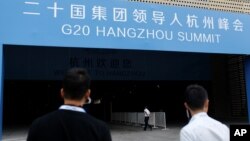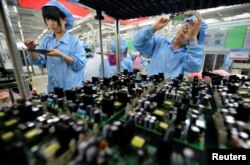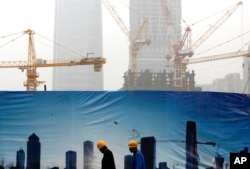China, with big ambitions as host of this year’s Group of 20 Nations leaders summit in Hangzhou, is aiming to put its stamp on the global body by forging a new economic model by promoting innovation.
But the country’s questionable track record on innovation and persistent obstacles to foreign investment here may make it difficult for Beijing to push forward with the important and much needed effort, analysts said.
The G-20 held its inaugural summit in 2008 during the global financial crisis. The meeting was set up to help coordinate global trade and financial policy and give emerging countries a bigger say in that discussion.
And since the crisis hit, China’s role as an international economic powerhouse has skyrocketed. It has risen to become the world’s second largest economy and is a growing source of global investment even as it struggles with slowing economic growth.
Big spender
Official statistics from China’s commerce ministry show that in 2008, Chinese firms invested $184 billion in total overseas and since then that figure has increased more than five-fold to exceed $1 trillion at the end of 2015.
China is clearly not the same country it was when the G-20 leaders summits began or when it joined the World Trade Organization in 2001, said Reuben Mondejar, a business professor at the City University of Hong Kong.
“China has been emboldened to act like a real leader. They don’t want to be a superpower, but they want the trappings of a leader,” Mondejar said.
Its hosting of G-20 meetings and leaders summit in Hangzhou this year is Beijing’s first foray as manager of the global economy in the post-crisis period, and many are watching closely to see how Beijing handles that role.
China knows this, and as host, one key aim it is focusing on is a proposal to build what it calls an “innovative, invigorated, interconnected and inclusive” global economy, a plan it hopes could help turn around not only its own, but the world’s sluggish growth as well.
According to State Council Yang Jiechi, who is in charge of the summit preparations, China is seeking to use this focus to steer the world economy to find new sources of growth by promoting innovation-driven development, including innovation in science and technology, development concepts, systems and business models as well as structural reforms.
Mixed track record
China has big ambitions and deep pockets for innovation and that investment is starting to pay off. This year, China saw itself move into the top 25 ranking of the United Nations World Intellectual Property Organization’s Global Index, making it the first time a middle-income country had joined the grouping.
Its track record at home, however, tells a different story and that is likely to make it difficult for other members of the G-20 to get on board.
Robert Atkinson, president of Washington-based Information Technology and Innovative Foundation said focusing on innovation, “is the right call, but unfortunately, China is poorly positioned to make that call given that many of their policies toward innovation harm, not help, global innovation.”
“China looks at innovation as zero-sum game where they win and others lose. As long as they have that attitude and the policies that lead to those results, China will not be able responsibly to take a lead as a global power broker,” he said.
In a recent survey, Atkinson’s foundation argued that China’s policies regarding forced technology transfers from foreign firms, manipulation of technology standards and rampant intellectual property theft explicitly harm global innovation.
The 56-nation report ranked China in 44th place, lagging far behind Singapore, Japan, Taiwan and Hong Kong in Asia. In other words, China has little to offer as the world’s 13th worst detractor of global innovation as long as it continues to hold on to its “innovation mercantilist” policies and mindset, the study concluded.
Atkinson said that if China wants to be a global power broker, it needs to focus on advancing global, not national interests. He urged leaders of the G-20 nations to call on China at the upcoming summit to instead roll back its protectionist innovation policies.
Soup or buffet
It is not just in the field of innovation where concerns are hindering China’s effort to spearhead the much needed initiatives to boost global growth. And even as its global influence grows and its reach abroad expands, it’s openness for business at home continues to be a major concern for foreign companies. In recent years, annual surveys by both the American and European Chamber of Commerce have cited growing and increasing concerns about China’s business environment.
A new business confidence survey released by the European Chamber of Commerce on Thursday said that with the economic slowdown in China, the business environment has become increasingly hostile and tilted in the favor of domestic enterprises.
Of those companies surveyed, 41 percent said they are now re-evaluating their China operations and planning to cut costs, including staff reductions.
Jörg Wuttke, president of the European Chamber said one major area of concern for China is that European companies’ investment in research and development remains low: only 28 percent of respondents said they have a R&D center in Mainland China.
He said that is indicative of European distrust of China’s vague and arbitrary legal system, which is highly inconsistent in the effective enforcement of intellectual property rights throughout China’s provinces.
“The system is so different,” Wuttke told VOA. “If you look at the European system and how Europe opens up for China. They can buy power grids, airports and banks and you see the difficulties such as the position paper today has shown of 900 cases where the market has closed up, it is clear that it is just soups and dishes here while there is a buffet back in Europe.”
Saibal Dasgupta also contributed to this report.















